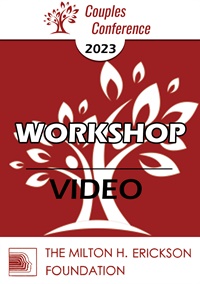CC23 Workshop 03 - Loving Power: Intimacy Beyond Patriarchy - Terry Real, LICSW
- Average Rating:
- Not yet rated
- Topic Areas:
- Workshops | Masculinity | Relational Life Therapy Model (RLT) | Intimacy | Love
- Categories:
- Couples Conference | Couples Conference 2023 | Pioneers in Couples and Family Therapy
- Faculty:
- Terry Real, LICSW
- Course Levels:
- Master Degree or Higher in Health-Related Field
- Duration:
- 1:34:03
- Format:
- Audio and Video
- Original Program Date:
- May 05, 2023
- License:
- Never Expires.
Description
Description: This talk introduces key insights from "Us: Getting Past You and Me to Build a More Loving Relationship", focusing on the concept of “loving power”—a blend of assertiveness and cherishing. It examines how patriarchy and individualism contribute to relational trauma and offers strategies from Relational Life Therapy (RLT), including loving confrontation, trauma repair, and skill-building. Emphasis is placed on self-disclosure, humility, and cultivating authentic connection.
Syllabus Description: Under patriarchy – the framework we all live within – one can be connected or powerful; but not both at the same time. This workshop gives nuts and bolts technique for helping our clients discover “soft” or “loving” power. How to stand up for one’s self and cherish one’s partner, and the relationship, in the same breath. How one partner can help empower the other to come through for them, a win/win for both.
Learn how to teach clients the 3 steps to getting what you want
– Daring to rock the boat
– Teaching them what you want
– Encouraging, rather than discouraging, progress
Learning Objectives:
- How to move beyond traditional gender binaries allowing for assertion and appreciation simultaneously
- Learning the Three Phases of getting what you want
- Learning a model of moving clients into mutual employment – more assertion up front, less resentment on the back end
Credits
Handouts
| Timestamped Transcript (926.5 KB) | 21 Pages | Available after Purchase |
| Ericksonian Learning Snapshot (251.2 KB) | 2 Pages | Available after Purchase |
Faculty

Terry Real, LICSW Related Seminars and Products
Terry Real, LICSW, is a nationally recognized family therapist, author, and teacher. He is particularly known for his groundbreaking work on men and male psychology as well as his work on gender and couples; he has been in private practice for over twenty-five years. Terry has appeared often as the relationship expert for Good Morning America and ABC News. His work has been featured in numerous academic articles as well as media venues such as Oprah, 20/20, The Today Show, CNN, The New York Times, The Wall Street Journal, Psychology Today and many others.


